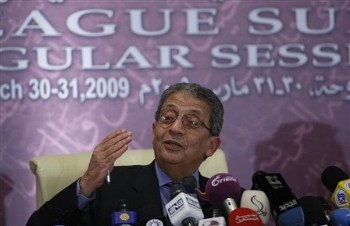Arab League chief says Darfur crimes different than ones committed in Gaza
March 28, 2009 (DOHA) – The Arab League Secretary General Amr Moussa rejected criticism that the pan-Arab organization is taking conflicting positions with regard to crimes committed in Sudan’s Western region of Darfur and the Gaza ones.

Bashir was charged on seven counts of war crimes and crimes against humanity, which include murder, rape and torture.
The draft resolution that will be presented to Arab leaders also supports the Arab League General Secretariat’s efforts to investigate possible war crimes that Israel committed during its offensive in Gaza.
Asked by reporter why they want the international court to investigate Gaza crimes and not Darfur, Moussa said the two situations are different.
“What is happening in Darfur is a semi-civil war and its responsibility is shared by many parties” the Arab League Secretary General said.
“The arrest warrant [by the ICC] is against a sitting president but what is occurring in Palestinian us a military occupation responsible for all that is committed on the ground” he added.
The Palestinian authority has deposited its acceptance of the ICC jurisdiction to allow the court to investigate in Gaza. The Palestinian justice minister Ali Kashan who met with the ICC prosecutor Luis Moreno-Ocampo last January told the Qatar based Al-Jazeera that the prosecutor “was very welcoming”
Ocampo said he is still analyzing the facts but he noted that the major obstacle is determining whether Gaza can be classified as a state within the definition of the international law or if it is considered part of Israel which has not ratified the Rome Statute.
Earlier today in his speech at the preparatory summit today the Arab League Secretary-General slammed the ICC’s decision as “questionable” also in light of “a double standard” it introduces, and called for a joint Arab effort to confront the warrant.
In 2004 the Arab League sent a fact finding commission to investigate Darfur human right violations but its report was never made public.
Moussa met with Bashir this month to discuss ways of overcoming the ICC decision.
The Arab League chief said in an interview with the London based Al-Sharq Al-Awsat that his trip to Sudan aims at preserving stability in Sudan but at the same time warned that there are “justice concepts that we are seeking and should not be ignored”.
Last July Sudan gave a cool reception to an Arab League proposal carried by Moussa on internal proceedings for Darfur war crimes suspects.
Moussa along with Arab and African countries seem to be focusing their efforts in lobbying the UN Security Council (UNSC) for an Article 16 resolution deferring Bashir’s indictment for a period of 12 month that could be renewed indefinitely.
But today the Sudanese state minister for foreign affairs Ali Karti rejected any move to press the UNSC on the issue.
Amnesty International has criticized the Arab League for siding with Bashir on the ICC arrest warrant suggesting double standard by the regional body.
“That the Arab League has been at the forefront of calling for international justice in the recent Gaza conflict makes it all the more incomprehensible that it should now actively assist President al-Bashir in his efforts to escape justice,” Amnesty International Secretary General Irene Khan said in a statement this week.
“The LAS should apply the same standard to crimes committed in Sudan as those they are demanding for war crimes and other serious violations of international law committed during the recent conflict in Gaza. They cannot have it both ways” she added.
In 2004 the UNSC formed a UN commission of inquiry to look into Darfur abuses headed by former President of the International Criminal Tribunal for the Former Yugoslavia (ICTY) Italian Antonio Cassese.
The commission concluded that the government did not pursue a policy of genocide in the Darfur region but that Khartoum and government-sponsored Arab militias known as the Janjaweed engaged in “widespread and systematic” abuse that may constitute crimes against humanity.
They further said that Sudanese judiciary is “is unable or unwilling” to prosecute those crimes and thus recommended referring the situation to the ICC.
The UNSC issued resolution 1593 under chapter VII in March 2005 referring the situation in Darfur to the ICC. The only Arab country at the council, Algeria abstained from voting.
(ST)
